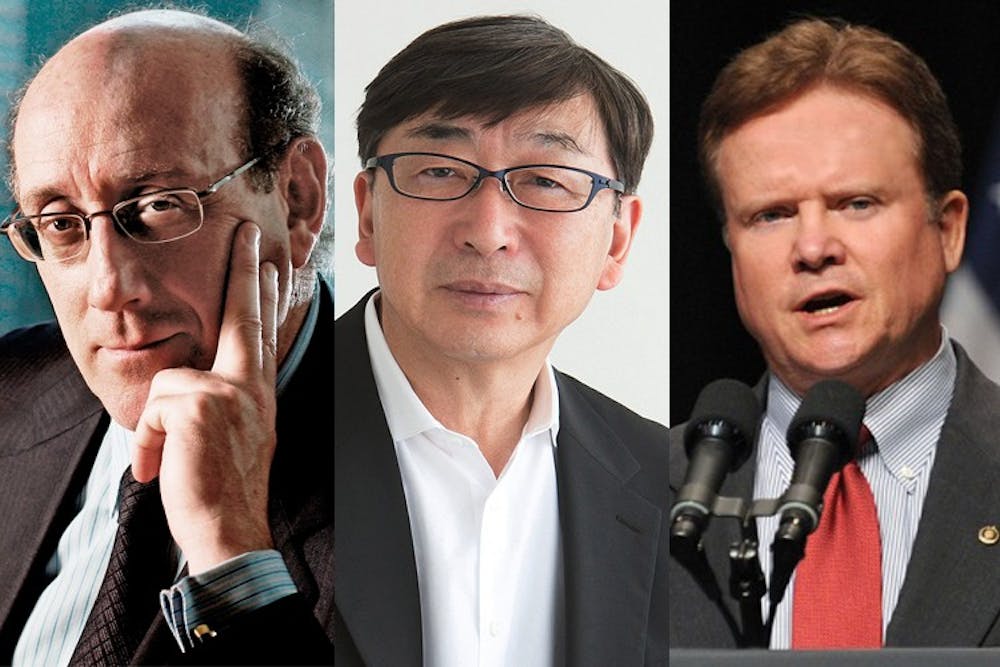University announces recipients of Jefferson medals
By Jiaer Zhuang
The University and the Thomas Jefferson Foundation at Monticello announced recipients of the 2014 Thomas Jefferson Foundation Medals in Architecture, Law and Citizen Leadership last week.
The medalists this year are Jim Webb, a former U.S. Senator (D-VA) and Secretary of the Navy, Toyo Ito, a Tokyo-based architect, and Kenneth R. Feinberg, an attorney and the founder of the law firm Fienberg Rozen LLP.
The Thomas Jefferson Foundation is an independent, nonprofit organization which owns and operates Monticello, Thomas Jefferson’s home.
The committee which made the selections consists of representatives from the Foundation and the Architecture, Law and the Batten schools.
According to a University press release, the medals are the highest honors bestowed by the University, which grants no honorary degrees. They recognize achievements Thomas Jefferson would hold in high regard.
“We look for candidates who have excelled in fields Thomas Jefferson embraced,” Ann H. Taylor, executive vice president of the Thomas Jefferson Foundation, said. “Jefferson is not only the author of the American Declaration of Independence — he was also a statesman, a lawyer and in many ways the architect of American life.”
Webb, recipient of the Foundation Medal in Citizen Leadership, has been a combat Marine, a counsel in Congress, an assistant Secretary of Defense, Secretary of the Navy, an Emmy-award winning journalist and filmmaker and has authored 10 books.
Webb wrote, introduced and guided the passage of the post-9/11 G.I. Bill, commonly regarded as the most significant veterans legislation since World War II. He also co-authored legislation exposing $60 billion of mismanagement in Iraq and Afghanistan wartime support contracts, and is a long-time advocate of fixing America’s “broken criminal justice system,” according to the press release.
Webb also contributed to the re-establishment of relations between the U.S. and Burma in 2009 when he became the first American leader to visit the country in 10 years.
As a writer and journalist, he received an Emmy Award for his PBS coverage of the U.S. Marines in Beirut in 1983. He also wrote the original story and was executive producer of the film “Rules of Engagement,” which held the top slot in U.S. box offices for two weeks in April 2000.
The Frank Batten School of Leadership and Public Policy will host a public talk by Webb on April 10 at 12:30 p.m. in Old Cabell Hall Auditorium.
Ito, the recipient of Foundation Medal in Architecture, is the architect best known for the temporary Serpentine Pavilion Gallery in London’s Hyde Park, the Tama Art University Library in Tokyo and Taiwan’s National Stadium, built to host the 2009 World Games. He is also a visiting professor at the at the University of Tokyo, Columbia University, the University of California at Los Angeles, Kyoto University, Tama Art University and the Harvard Graduate School of Design.
Ito is most famous for the critically acclaimed Sendai Mediatheque, a cube-shaped glass-walled structure whose floors are penetrated by 13 “tree-life” steel pipe superstructures that distribute “energies” of light, air, water, sound and information throughout the building’s open floor plan, according to the press release.
Ito said his approach to design aims at releasing people from conventional, restrictive frameworks and creating spaces in which people can feel at ease and attain a sense of freedom.
Ito has won numerous awards, while his works have been the at museum exhibitions in nine countries. He recently constructed the Toyo Ito Museum of Architecture on a small island in the Seto Inland Sea to showcase his past projects and open workshops for young architects.
The School of Architecture will host a translated public talk by Ito on April 11 at 3:30 p.m. in Old Cabell Hall Auditorium.
Feinberg, the recipient for the Foundation Medal in Law, has been appointed to serve on two presidential-level commissions and has taught as an adjunct professor of law at the University, as well as at Harvard and Georgetown.
Feinberg has become America’s go-to arbiter of compensation funds for victims of national tragedies, according to the press release. As a leading expert in mediation and alternative dispute resolution, Feinberg has administered compensation funds for victims of the Sept. 11 terrorist attacks, the 2007 shootings at Virginia Tech, the 2010 BP oil spill in the Gulf of Mexico, the 2012 mass shooting in a movie theater in Aurora, C.O. and the 2013 Boston marathon bombings, among other assignments.
As the special master of the federal Sept. 11 Victim Compensation Fund, Feinberg reached out to everyone who was qualified to file a claim, evaluated applications, determined appropriate compensation and disseminated awards. In 2005, he authored a book about the experience titled, “What is Life Worth?: The Unprecedented Effort to Compensate the Victims of 9/11.”
The School of Law will host a public talk by Feinberg on April 11 at 10 a.m. in Caplin Pavilion.
“We have a very distinguished group this year,” Taylor said. “This group of medalists represents the best in the fields that Jefferson pursued and provides leadership in those fields.”
The awards will be presented this year on April 11, the closest weekday to Jefferson’s birthday on April 13, known locally as Founder’s Day.







